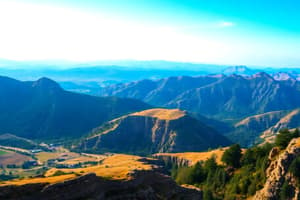Podcast
Questions and Answers
What is the primary focus of physical geography?
What is the primary focus of physical geography?
- Natural processes and Earth’s features (correct)
- Cultural characteristics of regions
- Human activities and their impact on environments
- Geographical data analysis using technology
Which subfield of human geography examines the spatial aspects of economic activity?
Which subfield of human geography examines the spatial aspects of economic activity?
- Political geography
- Urban geography
- Economic geography (correct)
- Cultural geography
What concept in geography refers to the unique characteristics of a location?
What concept in geography refers to the unique characteristics of a location?
- Place (correct)
- Location
- Movement
- Region
Which tool is a three-dimensional representation of Earth that provides accurate scale and area?
Which tool is a three-dimensional representation of Earth that provides accurate scale and area?
What are major ecological areas like forests and deserts classified as?
What are major ecological areas like forests and deserts classified as?
Which current geographic issue addresses the balance between economic growth and environmental protection?
Which current geographic issue addresses the balance between economic growth and environmental protection?
What does the Central Place Theory explain?
What does the Central Place Theory explain?
Which of the following is NOT a type of map?
Which of the following is NOT a type of map?
Flashcards are hidden until you start studying
Study Notes
Definition of Geography
- The study of places, the relationships between people and their environments.
- Focuses on physical features of the Earth as well as human societies.
Branches of Geography
-
Physical Geography
- Examines natural processes and features (landforms, climate, ecosystems).
- Subfields include geomorphology, climatology, biogeography, and hydrology.
-
Human Geography
- Analyzes human activities and their relationship with the environment.
- Subfields include urban geography, economic geography, cultural geography, and political geography.
-
Geographic Information Science (GIS)
- Focuses on the collection, analysis, and interpretation of geographical data using technology.
- Involves mapping and spatial analysis.
Key Concepts in Geography
- Location: The specific position of a place on Earth (absolute vs. relative location).
- Place: The human and physical characteristics that make a location unique.
- Region: An area defined by certain unifying characteristics (cultural, physical, or political).
- Movement: How and why people and goods move from one location to another.
- Human-Environment Interaction: The ways humans adapt to and modify their environment.
Tools of Geography
-
Maps
- Types: Physical, political, thematic, topographic.
- Essential for visualizing spatial relationships.
-
Globes
- Three-dimensional representation of Earth, providing accurate scale and area.
-
Remote Sensing
- The acquisition of information about Earth from satellites or aircraft.
-
GPS (Global Positioning System)
- Technology used for navigation and determining precise locations.
Major Geographic Regions
-
Continents
- Asia, Africa, North America, South America, Antarctica, Europe, Australia.
-
Climate Zones
- Tropical, arid, temperate, polar, and highland climates.
-
Biomes
- Major ecological areas such as forests, deserts, grasslands, and tundras.
Current Geographic Issues
- Climate Change: Effects on ecosystems, weather patterns, and human habitation.
- Urbanization: Growth of cities and its implications for infrastructure and resources.
- Globalization: Increased interconnectedness affecting culture, economy, and environment.
- Sustainable Development: Balancing economic growth with environmental stewardship.
Important Geographic Theories
- Central Place Theory: Explains the size and distribution of cities based on economic factors.
- Location Theory: Studies the geographic location of economic activities.
- Environmental Determinism: The belief that physical environment shapes human culture and actions.
Key Geographic Skills
- Map Reading: Understanding scale, symbols, and orientation.
- Spatial Analysis: Evaluating patterns and relationships in geographical data.
- Field Studies: Conducting research in a specific geographical area.
- Data Interpretation: Analyzing and drawing conclusions from geographic data sets.
Definition of Geography
- Study of places and relationships between people and their environments.
- Encompasses both physical features of the Earth and human societies.
Branches of Geography
-
Physical Geography
- Studies natural processes like landforms, climate, and ecosystems.
- Subfields include geomorphology (landforms), climatology (climate), biogeography (species distribution), and hydrology (water systems).
-
Human Geography
- Focuses on human activities and their interaction with the environment.
- Subfields include urban geography (cities), economic geography (trade), cultural geography (cultures), and political geography (political implications).
-
Geographic Information Science (GIS)
- Centers on the collection, analysis, and interpretation of geographical data via technology.
- Involves mapping techniques and spatial analysis methodologies.
Key Concepts in Geography
- Location: Defines where a place is situated (absolute location is fixed, relative location is context-dependent).
- Place: Attributes and characteristics that distinguish a particular location.
- Region: An area identified by shared characteristics, be they cultural, physical, or political.
- Movement: Examines the dynamics of how and why people and goods transport across locations.
- Human-Environment Interaction: Studies the adaptations and modifications humans make to their surroundings.
Tools of Geography
-
Maps
- Various types include physical, political, thematic, and topographic maps to illustrate different aspects.
- Crucial for understanding and visualizing spatial relationships.
-
Globes
- 3D models of Earth, providing accurate representations of scale and area.
-
Remote Sensing
- Gathers information about Earth's surface through satellites or aircraft technologies.
-
GPS (Global Positioning System)
- Navigation technology that determines specific locations with precision.
Major Geographic Regions
-
Continents
- Seven main landmasses: Asia, Africa, North America, South America, Antarctica, Europe, and Australia.
-
Climate Zones
- Categorized into tropical, arid, temperate, polar, and highland climates.
-
Biomes
- Major ecological classifications such as forests, deserts, grasslands, and tundras.
Current Geographic Issues
-
Climate Change
- Impacts ecosystems, weather patterns, and human living conditions.
-
Urbanization
- Expansion of cities influencing infrastructure and resource management.
-
Globalization
- Heightened interconnectedness affecting cultures, economies, and environments worldwide.
-
Sustainable Development
- Pursues economic growth while ensuring environmental protection.
Important Geographic Theories
-
Central Place Theory
- Provides a framework for understanding city size and distribution based on economic principles.
-
Location Theory
- Investigates the geographical placements of economic activities.
-
Environmental Determinism
- Argues that physical environments significantly shape cultural practices and human behavior.
Key Geographic Skills
-
Map Reading
- Skills in interpreting scale, symbols, and orientation on maps.
-
Spatial Analysis
- Involves evaluating geographic data to identify patterns and relationships.
-
Field Studies
- Primary research conducted within specific geographical settings to gather firsthand information.
-
Data Interpretation
- Ability to analyze geographic data sets and draw informed conclusions.
Studying That Suits You
Use AI to generate personalized quizzes and flashcards to suit your learning preferences.




